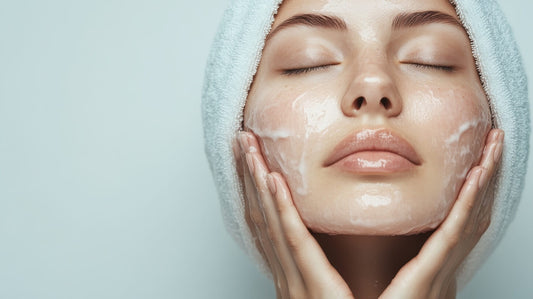By Ingredients

The Best Non-Comedogenic Oils for Face: Expert Picks & Benefits
Non-comedogenic face oils can hydrate and calm skin without clogging pores when matched to your skin type. This guide explains what non-comedogenic means, which oils are best for oily and acne-prone skin, and how to patch test and layer them safely.
The Best Non-Comedogenic Oils for Face: Expert Picks & Benefits
Non-comedogenic face oils can hydrate and calm skin without clogging pores when matched to your skin type. This guide explains what non-comedogenic means, which oils are best for oily and acne-prone skin, and how to patch test and layer them safely.

What Are Peptides In Skincare and Why You Need Them
Peptides are short chains of amino acids that send repair signals to the skin. Used consistently in leave-on serums and creams, they can support collagen, improve firmness and texture, and strengthen the barrier. This dermatologist's guide explains what peptides are, how they work, which ones to choose, and how to build them into a routine that delivers results.
What Are Peptides In Skincare and Why You Need Them
Peptides are short chains of amino acids that send repair signals to the skin. Used consistently in leave-on serums and creams, they can support collagen, improve firmness and texture, and strengthen the barrier. This dermatologist's guide explains what peptides are, how they work, which ones to choose, and how to build them into a routine that delivers results.

How to Stop Sunburn Peeling Overnight and Keep Your Skin Smooth
Peeling from sunburn is your skin’s natural repair process, but early care can reduce discomfort and speed recovery. Gentle cooling, deep hydration, barrier-repairing ingredients, and sun protection help minimize peeling and support smooth, healthy healing overnight.
How to Stop Sunburn Peeling Overnight and Keep Your Skin Smooth
Peeling from sunburn is your skin’s natural repair process, but early care can reduce discomfort and speed recovery. Gentle cooling, deep hydration, barrier-repairing ingredients, and sun protection help minimize peeling and support smooth, healthy healing overnight.

Sunscreen vs Sunblock: Key Differences And Which One To Choose?
Sunscreen and sunblock both protect against UV damage, but work in different ways - chemical vs. physical. Choosing the right one depends on your skin type, lifestyle, and preferences. Pairing SPF with skin-calming ingredients can enhance protection and skin health.
Sunscreen vs Sunblock: Key Differences And Which One To Choose?
Sunscreen and sunblock both protect against UV damage, but work in different ways - chemical vs. physical. Choosing the right one depends on your skin type, lifestyle, and preferences. Pairing SPF with skin-calming ingredients can enhance protection and skin health.

Niacinamide vs Hyaluronic Acid: Which One Should You Use for Your Skin?
Niacinamide and Hyaluronic acid are two powerhouse skincare ingredients with distinct roles. Niacinamide (Vitamin B3) strengthens the skin barrier, regulates oil production, reduces inflammation, minimizes pores, and fades hyperpigmentation. Hyaluronic Acid, along with alternatives like Saccharide Isomerate, Glycerin, and Squalane, acts as a moisture magnet, providing deep hydration and plumping effects, making it beneficial for dry and dehydrated skin. While Hyaluronic acid delivers immediate hydration, Niacinamide supports long-term skin health and resilience. Used together, they create a well-rounded routine that enhances moisture retention and strengthens the skin barrier for a healthier, more radiant complexion.
Niacinamide vs Hyaluronic Acid: Which One Should You Use for Your Skin?
Niacinamide and Hyaluronic acid are two powerhouse skincare ingredients with distinct roles. Niacinamide (Vitamin B3) strengthens the skin barrier, regulates oil production, reduces inflammation, minimizes pores, and fades hyperpigmentation. Hyaluronic Acid, along with alternatives like Saccharide Isomerate, Glycerin, and Squalane, acts as a moisture magnet, providing deep hydration and plumping effects, making it beneficial for dry and dehydrated skin. While Hyaluronic acid delivers immediate hydration, Niacinamide supports long-term skin health and resilience. Used together, they create a well-rounded routine that enhances moisture retention and strengthens the skin barrier for a healthier, more radiant complexion.

Can I Use Niacinamide With Tretinoin? A Dermatologist’s Guide To Combine Them Safely
Tretinoin and niacinamide are a powerful skincare duo—but can they be used together? When combined correctly, they help fight acne, improve skin texture, and reduce irritation. This guide explains how to use niacinamide with tretinoin safely, the best application order, and tips to maximize their benefits.
Can I Use Niacinamide With Tretinoin? A Dermatologist’s Guide To Combine Them Safely
Tretinoin and niacinamide are a powerful skincare duo—but can they be used together? When combined correctly, they help fight acne, improve skin texture, and reduce irritation. This guide explains how to use niacinamide with tretinoin safely, the best application order, and tips to maximize their benefits.






